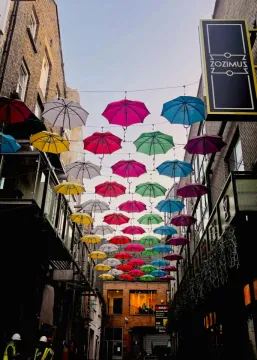Ireland is a country: a trip to the Emerald Isle

Nicknamed the “Emerald Isle” due to its lush green landscapes and natural beauty, Ireland is a fascinating country with a unique history, culture and traditions. Located in northwestern Europe, this island nation captivates travelers from around the world with its blend of Celtic mythology, bustling cities, stunning coastlines and the warm hospitality of its people.
If you've ever wondered what makes Ireland such a special destination, learn about its geography, history, culture, cuisine, and more in this article. Join us on this tour of one of the most charming countries in the world!
- Geography and Nature
Ireland is an island in the Atlantic Ocean, west of the United Kingdom. It is divided into two parts: the Republic of Ireland, which occupies most of the territory, and Northern Ireland, which is part of the United Kingdom. The climate is oceanic, with mild winters and cool summers, which contribute to the lush, green landscapes.
Breathtaking landscapes
Ireland is known for its natural diversity. From the Cliffs of Moher, which rise more than 200 metres above the sea, to the mystical region of Connemara, every corner of the country is a visual spectacle. Other natural wonders include the Ring of Kerry, a scenic route lined with mountains, lakes and beaches, and the Giant's Causeway, a geological formation unique to Northern Ireland.
Nature lovers can also explore Ireland's many national parks, such as Killarney National Park, home to red deer and ancient ruins.
- History of Ireland: a country with deep roots
Ireland's history is rich in events that have shaped its identity. From the arrival of the Celts more than 2,500 years ago to its struggle for independence in the 20th century, the country has experienced moments of great significance.
Celtic era and mythology
The Celts arrived around 500 BC in Ireland in 1000 BC and brought with them their language, religion and customs. Celtic mythology lives on in Irish culture in stories of gods, warriors and magical creatures such as leprechauns and fairies.
The Vikings and the Middle Ages
In the 8th and 9th centuries, Vikings invaded Ireland and founded settlements such as Dublin, which was originally a Viking trading port. Later in the Middle Ages, there were numerous monasteries and castles in Ireland, many of which can still be visited today.
Independence and modern Ireland
In 1922, after years of struggle, Ireland gained independence from the United Kingdom and became the Irish Free State. Decades later, in 1949, the Republic of Ireland was proclaimed, while Northern Ireland remained part of the United Kingdom.
- Irish culture: music, literature and festivals
One of the most fascinating aspects of Ireland is its vibrant culture filled with unique music, literature and traditions.
Traditional music and dance
Irish music is known all over the world. Instruments such as the fiddle, bagpipes and bodhrán (a type of drum) produce cheerful and melancholic melodies that can be heard in pubs and at festivals. Irish dancing with its fast steps is also famous, especially thanks to shows such as Riverdance.
Literature and great writers
Ireland has given the world some of the most influential writers in history, including James Joyce, author of Ulysses ; Oscar Wilde, best known for The Picture of Dorian Gray ; and WB Yeats, poet and Nobel Prize winner.
Irish Holidays
St. Patrick's Day, celebrated on March 17, is Ireland's most important holiday. On this day, towns fill with parades, music and beer, and people dress in green in honor of the country's patron saint.
Other holidays include Samhain, the ancient Celtic festival from which Halloween originated, and Bloomsday, which celebrates the work of James Joyce.
- Cities and places you shouldn't miss
Dublin: the dynamic capital
Dublin is the cultural and economic heart of Ireland. Top attractions include:
- Trinity College and the Book of Kells: One of the most prestigious universities in the world with an impressive library housing the famous 9th century illuminated manuscript.
- Temple Bar: The city's most famous bar district, where live music and beer are never lacking.
- Guinness Storehouse: The Guinness Brewery Museum, where you can learn about the history of beer and enjoy a pint on the panoramic viewing platform.
Galway: the bohemian city
Galway is located on the west coast and is famous for its artistic atmosphere, lively pubs and proximity to the Cliffs of Moher.
Cork: the gastronomic capital
Cork is known for its incredible food scene and the English Market, where you can sample the best of the region's produce.
Belfast: The Story of Northern Ireland
Belfast, the capital of Northern Ireland, offers a journey through the history of the Titanic, built in its shipyards, and political murals that reflect its turbulent past.
- Irish cuisine: typical dishes
Irish cuisine is simple yet delicious and consists of dishes that combine fresh, local ingredients. The most well-known ones include:
- Irish Stew: A lamb stew with potatoes, carrots and onions.
- Boxty: a type of potato pancake.
- Yeast bread: Traditional bread made with yeast instead of leavening.
- Full Irish Breakfast – A hearty breakfast with eggs, sausages, bacon, black pudding, tomatoes and toast.
- Guinness: Ireland's most famous stout, with an intense and creamy flavour.
- Ireland as a tourist destination
Ireland is an ideal destination for all types of travelers. History buffs will enjoy the castles and ancient ruins, while adventurers can explore the nature trails and cliffs. Those seeking culture and entertainment will find unforgettable pubs, music, and festivals in Irish cities.
Furthermore, the hospitality of the Irish people ensures that every visitor feels at home. Their friendliness and sense of humour have made Ireland one of the most hospitable countries in the world.
Diploma
Ireland is a country full of magic, history and natural beauty. From the lush green landscapes to the bustling cities, every corner of this island has something special to offer.